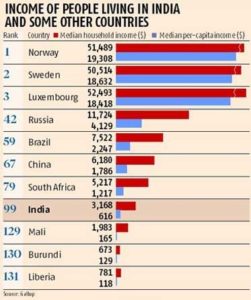This post takes off from what I read in Millennial Revolution about a million dollar house-poor owner in Toronto, Canada. The inference is similar to what I experienced personally in Washington DC. We Americans and Canadians love home-ownership, and so do Australians from what I have heard. In my business trip to Spain recently, I learned Spaniards also cherish home-ownership almost as a cultural mandate. Then, I started wondering whether all this only holds true in large developed markets or does it apply even in developing markets. Perhaps only the developed world is living with contagious house fever?
I started contacting my friends living in other countries and requested them to share data. My prompt American friend in India shared some interesting statistics about Bangalore where he lives. I thought I will share the data here for all of you to ponder.
The dream is alive
An upscale condo development project in Bangalore apparently offers 3 bedroom, 3 bath condos (over 1800 sq. ft.) at a cost of $250,000. That’s a lot of money for a country where the median annual household income is just $3,168 and even the relatively high-earning IT project manager makes an average of INR 1.2 million (~$18,000) a year. This makes the price to income ratio an insanely high 13.8. Moreover, this is in a market where the mortgage interest rates are near 10%! Imagine, how much more would the house prices shoot up if mortgage loans were available at 5% or less in India?
My friend tells me there is poor correlation between home prices and even a professional-level of income in India, as several complex dynamics are at play in that market. Perhaps due to the lack of mature capital markets or people’s high risk perception towards equities, the real estate market is the largest beneficiary from all that wealth being created in the world’s fastest growing economy. Many wealthy Indians have multiple houses and see them as secure investments, but that’s no different than 1%ers like fellow blogger Physician on FIRE. I have heard similar feedback about Chinese high earners as well, which fellow blogger Tawcan also explained.
Renter’s dream?
Can you guess the rental yield of such a high-priced apartment? Barely 3.6%! 😳 My friend estimates that you can expect an maximum rent of INR 50,000 (~$750) per month for this kind of place, so $9,000 a year. Understandably, the correlation between rent and professional income seems to be relatively better. After all, for this rent to be about 1/3rd of your monthly living expenses, you should be earning INR 1.8 million ($27,000) a year, that too after taxes. Even a relatively high earning IT project manager doesn’t make this much money in India from what I know. So, the rental market for this upscale apartment depends on the top-tier (perhaps the top 10%) professional wage-earners in the Bangalore market. Turns out, this statistic is not an extreme case. Rental yields in other metro cities in India are also at an unbelievably low 2.5-4.4%!
Why bother about rental yields if you are going to live in it? It matters even if you live in the place because rental yield is a good metric for understanding the relative cost of the house you bought and also, to estimate your opportunity cost of plunking your money down versus alternative investments. It is also an easily understood proxy for cap rate, which is what real estate investors use to check the attractiveness of a rental property.
Decoding the choice
The part I don’t understand is that why would anyone pay $250K for an apartment that can generate, at best, $9K/year in rent? Why are people clamoring for rental yields of barely 3-4% when inflation runs at 5-6% and even a safe government bond in that market offers 7-8% interest?!
The answer, I am told, has to do with decades of ever-increasing real estate prices. Indians believe that real estate is the sure thing to a secure, stable asset building plan that can hold up to inflation. Clearly, that government bond principal is not inflation-adjusted, so in order to attract investors, it must offer a nominal interest above the rate of inflation. It also helps that the frictional cost of buying and selling a house is low there (~1% of value) than in North American markets. Property taxes are also quite low. Perhaps that is why despite such extremely high price to income ratio and low rental yields, there is a strong demand for housing, even expensive homes like the apartment my friend found out. I guess if no other asset class holds as much interest and if options for investing discretionary income are limited, then houses become the only real investment avenue for all the money a fast-growing economy generates. I don’t know if this is a bubble but it seems to be holding up quite well over there.
I haven’t covered countries in Latin America, Eastern Europe, Far East and Middle East in this article but if you know of the situation first-hand about housing, mortgages and buy vs rent debate in those markets, please share your views in the comments below.
House-bound world?
So, folks, this house buying herd behavior is not limited to just the U.S., Canadian and similar markets. Developing markets also seem to be under this spell of house fever. I am not against real estate as I have taken the middle road in investment real estate but you must know what you are doing and see if you have any unique advantages in this space so that you don’t get skinned alive in a high-leverage investment.
What are your thoughts? In the countries where you live or have lived, what factors influence house purchase versus renting? As FIREcracker experienced, could this be just an Asian cultural thing where you can be ‘disowned’ for not owning your house even if you are a millionaire?
While you comment on these questions, I will leave you with a quote by George Bernard Shaw:
“Fools build houses. Smart people live in them.”
Raman Venkatesh is the founder of Ten Factorial Rocks. Raman is a ‘Gen X’ corporate executive in his mid 40’s. In addition to having a Ph.D. in engineering, he has worked in almost all continents of the world. Ten Factorial Rocks (TFR) was created to chronicle his journey towards retirement while sharing his views on the absurdities and pitfalls along the way. The name was taken from the mathematical function 10! (ten factorial) which is equal to 10 x 9 x 8 x 7 x 6 x 5 x 4 x 3 x 2 x 1 = 3,628,800.




10 comments on “House Fever: It’s Global”